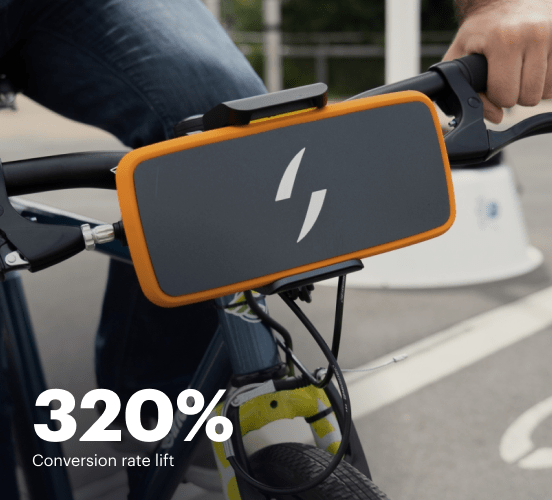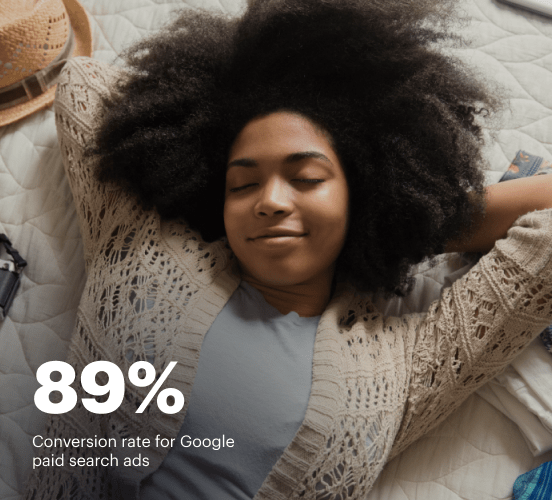Shopify vs. Pardot: the best platform for a seamless web experience
Discover how Shopify compares to Pardot regarding features and usability. Find out which platform provides the competitive advantage your business deserves.
Get startedSee how Instapage stacks up against the competition
| Feature | Instapage | Other builders |
| Drag-and-Drop Tools | ||
| Conversion-optimized templates | ||
| Manual and AI-powered A/B Tests | ||
| AI content suggestions | ||
| Popups and sticky bars | ||
| Canvas and grid blocks | ||
| Reusable and global elements | ||
| Form and popup builders | ||
| Built-in Heatmaps | ||
| Central analytics dashboard | ||
| Ad-to-page personalization and collections | ||
| Contacts, lists, and email | ||
| Dedicated, full-service CRO experts | ||
| Enterprise-ready platform |
Leading the way in building high-performing landing pages





Why Instapage is the smarter choice for your campaigns
Get everything you need to build, scale, and optimize high-converting landing pages—without coding.
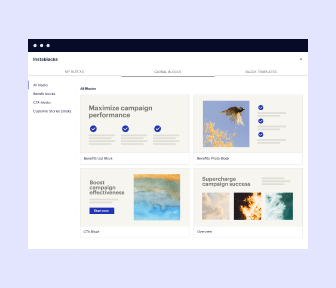
Easier page building without coding
Instapage offers a flexible and seamless page creation experience with a library of 500+ conversion-focused layouts, Instablocks®, a drag-and-drop builder, and AI content generation. With technologies like Thor Render Engine®, you can create on-brand, mobile-responsive landing pages that load quickly and start converting during initial visitor clicks.
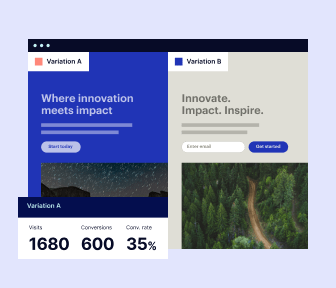
More insights — better results
Instapage lets you see in detail how each landing page experience and variation is performing so you can make targeted changes that boost page conversions. Use heatmaps for a better understanding of on-page activities, run A/B tests and AI-assisted experiments, and then track and evaluate results within robust analytics dashboards.
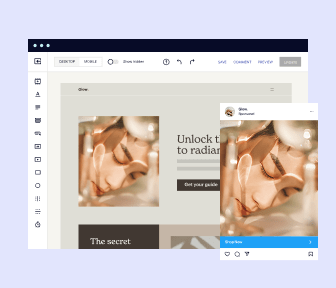
More personalized experiences
Instapage lets you quickly create high-performing landing pages tailored to each of your ad campaigns. Deliver personalized experiences for distinct audiences using dynamic text replacement. Effortlessly align specific advertisements to unique pages with AdMaps. Monitor audience-level metrics using our advanced data tools.
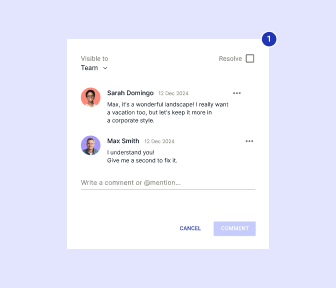
Built-in collaboration
Instapage collaboration capabilities bring your entire team together to speed up the process of landing page review, approval, and launch. No more frustrating and unnecessary revisions or edits scattered across emails. Provide instant feedback, conduct real-time page edits, and securely share your pages with outside stakeholders.
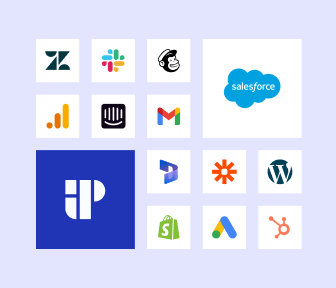
Free up time for your business
Invest time into business growth, not busy work. Launch landing pages faster with reusable forms and templates. Build once, reuse forever.
Explore all integrations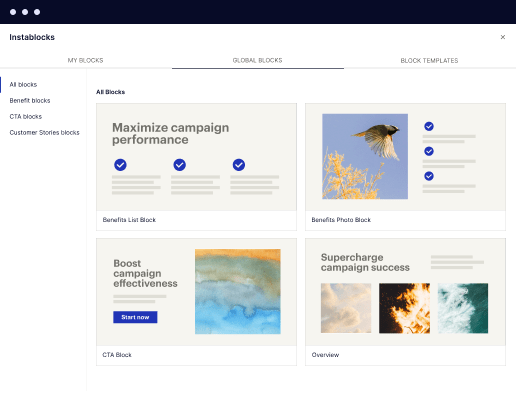
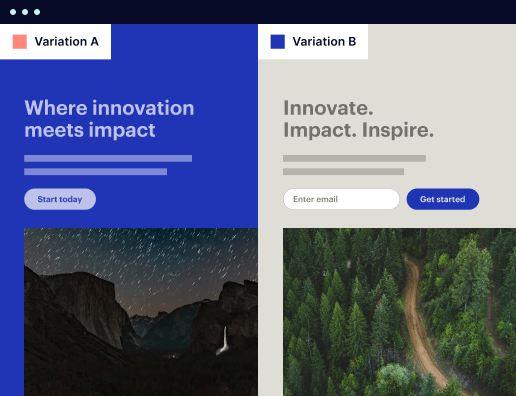
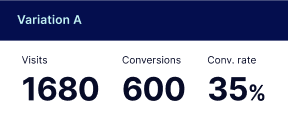
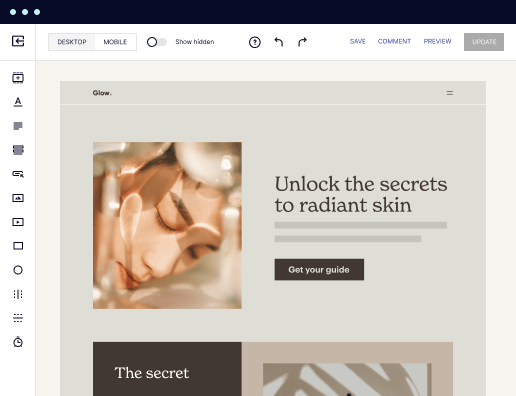

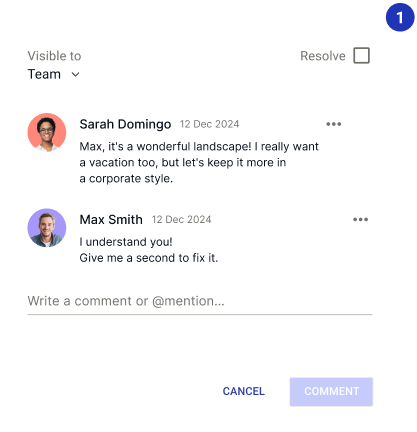
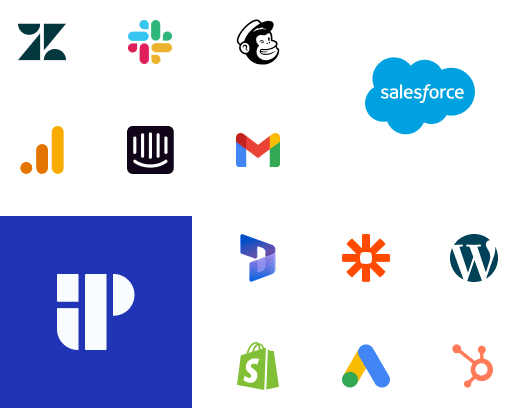
Easier page building without coding
Instapage offers a flexible and seamless page creation experience with a library of 500+ conversion-focused layouts, Instablocks®, a drag-and-drop builder, and AI content generation. With technologies like Thor Render Engine®, you can create on-brand, mobile-responsive landing pages that load quickly and start converting during initial visitor clicks.
More insights — better results
Instapage lets you see in detail how each landing page experience and variation is performing so you can make targeted changes that boost page conversions. Use heatmaps for a better understanding of on-page activities, run A/B tests and AI-assisted experiments, and then track and evaluate results within robust analytics dashboards.
More personalized experiences
Instapage lets you quickly create high-performing landing pages tailored to each of your ad campaigns. Deliver personalized experiences for distinct audiences using dynamic text replacement. Effortlessly align specific advertisements to unique pages with AdMaps. Monitor audience-level metrics using our advanced data tools.
Built-in collaboration
Instapage collaboration capabilities bring your entire team together to speed up the process of landing page review, approval, and launch. No more frustrating and unnecessary revisions or edits scattered across emails. Provide instant feedback, conduct real-time page edits, and securely share your pages with outside stakeholders.
Free up time for your business
Invest time into business growth, not busy work. Launch landing pages faster with reusable forms and templates. Build once, reuse forever.
Explore all integrationsGet started with Instapage in a few steps
-
Create your Instapage account
Start with Instapage by signing up via Google or your email. You'll get access to a free 14-day trial to discover Instapage capabilities. Feel free to cancel anytime during the 14-day trial if you decide that our product is not suitable for your business. -
Build and personalize your page
Create your first landing page from scratch or choose a template from 500+ customizable layouts. Use the drag-and-drop builder to add page elements, fonts, and backgrounds, refine content with AI, or add custom HTML, Javascript, and CSS. -
Review and make edits
Collaborate on page designs and streamline review processes. Invite your team members and stakeholders to review, edit, and provide feedback on your landing page. Collaborate knowing your page is confidential and only accessible to authorized users. -
Publish and track page performance
Publish your page to a domain or custom URL. Connect your pages to the ads you've created and track page performance within the analytics dashboard, run A/B tests and AI experiments, analyze results, and continuously optimize your landing page to maintain high conversions.
Shopify vs. Pardot: The Digital Marketing Clash of Titans
In the ever-evolving landscape of e-commerce and digital marketing, the competition is fierce. Entrepreneurs and marketers find themselves navigating a plethora of platforms, each boasting unique features and capabilities. Among these, Shopify and Pardot stand out as major players, each offering a distinct approach to online business and marketing automation. Shopify, known for its user-friendly e-commerce solutions, empowers businesses to set up shop with ease, allowing for seamless transactions and attractive storefronts. On the other hand, Pardot is a titan of marketing automation, providing robust tools to nurture leads and automate marketing campaigns. But wait! There's a surprise contender lurking in the shadows—Instapage. This landing page platform may be the dark horse that redefines how we view digital marketing effectiveness. As we traverse this comparative journey, we will highlight the strengths and weaknesses of Shopify and Pardot while giving Instapage its due consideration. So buckle up as we dive into an in-depth analysis to determine which platform might be the ideal fit for your needs.
Introducing the Key Contenders
As we step into the ring, let's briefly introduce our heavyweights. Shopify, established in 2006, has evolved into a powerhouse e-commerce platform, catering to more than a million businesses worldwide. Its straightforward setup and extensive app ecosystem make it a favorite among budding entrepreneurs. Now, let’s not forget Pardot, a robust marketing automation solution from Salesforce that's a game-changer for B2B marketing teams. By providing tools for lead scoring, nurturing, and comprehensive analytics, Pardot allows marketers to create personalized experiences. Both platforms come with their unique gamemanship in the digital arena, creating the perfect backdrop for a riveting comparison. In a marketing world where keyword optimization, lead generation, and customer retention are pivotal, businesses must weigh their options carefully. And speaking of options, Instapage is the silent guardian watching over this showdown with its specialized focus on high-converting landing pages. Where Shopify and Pardot provide broader services, Instapage hones in on the art of conversion optimization. With all these contenders in the ring, it’s time to break down the features and see who brings the most to the table.
Feature Showdown: A Duel of Capabilities
In this round, we’re diving into the key features each contender boasts. Shopify shines with its extensive catalog management, secure payment gateways, and mobile optimization. It doesn’t shy away from visual customization either, making sure your brand stands out with engaging themes and aesthetic layouts. Conversely, Pardot comes in strong with lead scoring, segmentation, and comprehensive reporting tools that help marketers get as personal as possible with their outreach. But wait—the tension ramps up here as we tease the presence of Instapage, which specializes in landing page A/B testing and templates designed for conversion. Its ability to integrate seamlessly with multiple platforms can give it an edge in marketing tactics when paired with Shopify or Pardot. Both Shopify and Pardot may tout impressive features, yet Instapage is steadily warming up in anticipation of a potential shift in the battle for marketing supremacy.
Usability: A Journey Through the User Experience
When it comes to usability, both Shopify and Pardot cater to their audiences exceptionally well. Shopify targets both novices and experienced merchants, ensuring anyone can whip up an online store. The intuitive drag-and-drop interface lowers the barriers for entry, but seasoned users also find advanced functionalities that make the platform robust. Meanwhile, Pardot acknowledges that marketing is both an art and a science, offering an abundance of resources, tutorials, and a support community that guides users through the abundant features. However, the complexity may initially serve as more of an adventure than an impediment; learning to navigate Pardot is akin to embarking on an exciting journey rather than facing a daunting learning curve. Instapage stands out here too, with its user-centric design focused on converting through simplicity. Whichever platform you choose, rest assured that you will find resources and support that cater to your marketing goals.
Shopify’s Key Features Worth Noting:
- All-in-one e-commerce platform suitable for diverse business needs
- User-friendly interface suitable for newcomers
- Customizable storefront templates for branding
- Secure payment processing with multiple options
- In-depth analytics and reporting features for tracking performance
Pardot’s Standout Features:
- Comprehensive lead scoring and nurturing functionalities
- Robust campaign management tools for B2B marketers
- Integration with Salesforce for seamless data synchronization
- Personalized content and email automation capability
Common Strengths Shared by Shopify and Pardot:
- Intuitive dashboards that make navigation easier
- Extensive third-party integrations to enhance functionality
- Access to customer support and community forums
- Multi-channel marketing capabilities
- Scalability to grow alongside business needs
- Focus on data-driven decision-making with insightful analytics
As we wrap up this evaluation, it becomes clear that Shopify and Pardot are formidable competitors in their respective areas. Yet, Instapage lurks in the wings, ready to steal the show with its specialized services that complement these platforms. Both Shopify and Pardot may be in the spotlight for their robust offerings, but Instapage could be the hero that enhances conversion rates and streamlines marketing efforts, taking your strategy to new heights.
Performance Metrics: Who Packs the Most Punch?
Now, let’s compare performance metrics like page loading times and mobile responsiveness. After all, a sluggish website is akin to molasses in winter—unbearable and frustrating for any user. Shopify takes pride in its fast loading speeds, ensuring a smooth shopping experience that keeps customers engaged. Its mobile optimization is also on point, making sure that potential buyers can easily navigate on various devices. On the flip side, Pardot's performance may depend largely on the web pages and emails you create using it, thus keeping a sharp focus on design is vital for ensuring your marketing content performs optimally. Instapage shines in this arena with its built-in optimization functionalities, ensuring that landing pages load fast and are mobile-friendly. When performing A/B tests, users can rely on a robust analytics system to identify bottlenecks promptly. If performance can make or break a sale, both Shopify and Instapage position themselves as frontrunners in delivering fast, reliable experiences.
Support Framework: The Backbone of User Experience
Support is crucial in any platform—imagine your support team as the trusty sidekick always ready to rescue you with advice and assistance. Shopify offers 24/7 support through various channels including phone, email, and live chat, ensuring that help is always at hand. Their community forums are buzzing with discussions, tips, and shared experiences to aid users. Pardot, being part of Salesforce, benefits from robust resources and comprehensive support options that are tailored for its extensive user base. It also has an active user community that shares insights on optimizing marketing processes. Instapage, too, provides excellent customer assistance, with thorough documentation, quick response times, and an interactive community. Each platform has its unique strengths, but a strong support structure is foundational in ensuring user satisfaction.
Comparing Pricing Models: The Value Game
Advantages of Shopify’s Pricing Strategy:
- Flexible subscription plans catering to different business sizes
- 14-day free trial for hands-on exploration
- Transparent pricing with no hidden fees
- Inbuilt payment processing reducing extra transactional costs
Positives of Pardot’s Pricing Strategy:
- Multiple tiered plans to suit various marketing needs
- Comprehensive tools for lead management and marketing automation
- Access to robust analytics without the burden of extensive add-on costs
- Ability to integrate with Salesforce for consolidated data insights and support
When evaluating pricing strategies, Shopify shines with its user-friendly approach, making it accessible for start-ups and larger enterprises alike. Pardot, with its unique focus on B2B marketing, may seem pricier at a glance but offers an array of features that justify its cost to marketing teams. Instapage, with its adaptable pricing models, positions itself as the best value for money. Flexible options cater to businesses small and large, allowing for maximum ROI of advertising spend.
It's time to take a closer look at the pricing tiers offered by these platforms. Transparency is key, and viewers often discover hidden gems that emerge when delving into different options. Whether it’s Shopify's dynamic range of plans or Pardot’s specialized focus, understanding the full scope of each platform's pricing will prepare users for potential surprises that come their way.
And Then There’s Instapage: The Underdog Champion
Stepping into the conversation, Instapage emerges as the mentor that has silently observed while crafting its niche. With unparalleled features for building high-converting landing pages and advanced analytics, it distinguishes itself as a valuable asset for any marketing strategy. Instapage goes beyond mere aesthetics; it provides tools that optimize conversions by fine-tuning landing pages for peak performance. Its integration capabilities allow marketers to send leads seamlessly to their preferred CRM or email software, creating a smooth data flow for campaigns. While Shopify and Pardot cater effectively to e-commerce and B2B needs respectively, Instapage bridges the gap, showcasing how focused solutions can meet comprehensive marketing demands. This platform can very well be the secret ingredient that enhances marketing efforts and ensures effective engagement with target audiences. Maximizing results often requires a multi-platform approach where one tool fills in the gaps left by others, making Instapage an invaluable partner. No matter your business, the options are only as good as the choices you make.
In the end, the power lies in making informed decisions tailored to your unique business goals. Whether you're drawn to the robust e-commerce capabilities of Shopify, the strategic marketing prowess of Pardot, or the conversion-focused design of Instapage, you're taking a step toward elevating your business. Each platform offers its merits, and the true winner depends on the specific needs of your marketing strategy. Consider exploring further with Instapage, as it may just provide the spark that propels your campaigns to new heights.

